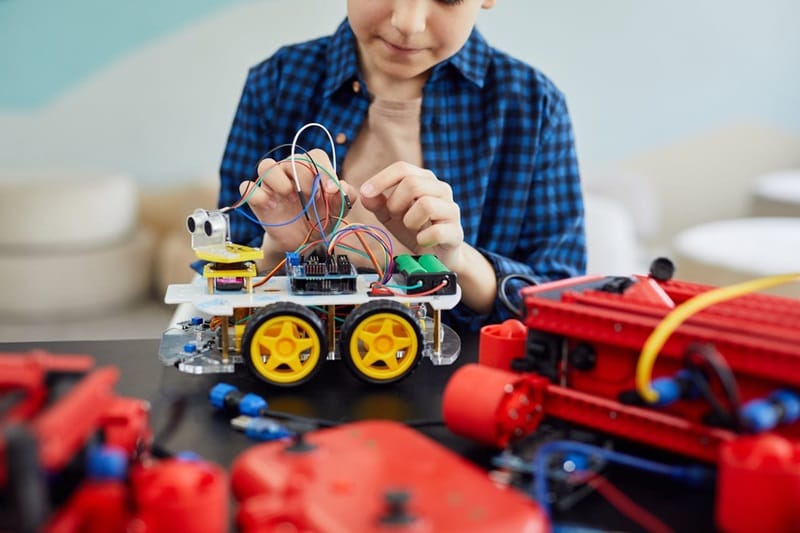How to Equip Your Kids With Essential Life Competencies

The World Economic Forum's Future of Jobs 2023 Report offers insights that are vital for parents as they nurture the next generation’s “life competencies”. The report underscores the shift in demand for skills due to factors like digitalization, automation, environmental transformation, and socioeconomic changes.
Here’s an in-depth look at what these findings mean for parents aiming to support their children in developing life competencies essential for future success.
Building Cognitive Flexibility and Lifelong Learning
The report highlights analytical thinking and creative problem-solving as paramount in the future workplace, with analytical thinking identified as the top skill demanded by companies. Creative thinking, resilience, curiosity, and lifelong learning are also recognised as vital skills that will continue to grow in importance. This emphasis suggests that children should be encouraged to approach problems innovatively, think critically, and adapt when faced with challenges.
For parents, fostering cognitive flexibility at home can mean:
- Encouraging children to ask questions and explore various problem-solving methods.
- Supporting them in activities that require creativity, such as puzzles, coding, and storytelling.
- Engaging them in discussions that require analysis, reasoning, and making connections between concepts.
Technological Literacy and Digital Proficiency
With big data, AI, digital platforms, and cloud computing among the most transformative forces expected to reshape job markets, technological literacy is crucial. The report predicts that these technologies will drive job creation, though they may also displace certain roles, making proficiency in these areas a competitive advantage.
Parents can promote digital competency by:
- Introducing age-appropriate technology-focused activities, such as simple coding games or robotics kits.
- Encouraging responsible internet use, teaching children to critically evaluate information, and highlighting the importance of cybersecurity and data privacy.
- Supporting formal and informal learning that introduces children to new digital tools and applications, which could prepare them for more advanced technology training later in life.

Developing Emotional Intelligence and Interpersonal Skills
In an increasingly automated world, human-centric skills like empathy, active listening, social influence, and leadership are gaining importance. The report points out that while tasks requiring high levels of cognitive effort may see some automation, interpersonal and emotional intelligence are likely to remain uniquely human strengths.
Parents can help nurture these skills by:
- Encouraging group activities and collaborative problem-solving exercises.
- Teaching empathy and active listening by discussing social issues and showing the importance of understanding others’ perspectives.
- Encouraging participation in community service or team-based extracurricular activities to help children build social influence and leadership skills.
Promoting Environmental Awareness and Adaptability
The green transition and climate-change-related investments are expected to create substantial job opportunities, with environmental stewardship and sustainability-focused skills becoming core competencies. These findings suggest that understanding environmental issues and adapting to sustainability practices will be increasingly valued in the workforce.
Parents can foster environmental awareness by:
- Educating children about sustainability and involving them in eco-friendly activities such as recycling and conserving resources.
- Encouraging outdoor learning and discussing the importance of climate change and biodiversity conservation.
- Supporting them in learning about renewable energy, climate science, and other areas that can provide a foundation for future green jobs.
Encouraging Resilience, Flexibility, and Self-Motivation
Self-efficacy skills, particularly resilience, flexibility, and self-motivation, were noted as rapidly rising in importance. With the report forecasting significant job churn due to economic, environmental, and technological shifts, children need the resilience to adapt and persevere in the face of change.
Parents can instill these qualities by:
- Teaching children how to handle setbacks constructively and encouraging them to view failures as learning opportunities.
- Promoting independence by allowing them to set personal goals and work toward them with guidance.
- Providing a supportive environment that values self-motivation and continuous improvement, helping children build confidence in their abilities.
Broadening Global and Cultural Perspectives
The report notes the ongoing impact of globalisation and demographic shifts, which suggests the need for global citizenship and cross-cultural communication skills. In a globally connected world, children who understand and appreciate diverse cultures and perspectives will have an advantage in both interpersonal and professional realms.
Parents can support a global outlook by:
- Exposing children to different cultures through books, language learning, and travel (when possible).
- Discussing current global issues, encouraging children to think about how these issues affect people worldwide.
- Encouraging participation in cultural exchange programs, online communities, or diverse social groups to help children become more culturally aware and globally minded.
You can download a PDF copy of the Future of Jobs Report 2023 here.
Our aim is to help our children discover their talents, realise their full potential, and develop a passion for life-long learning.





